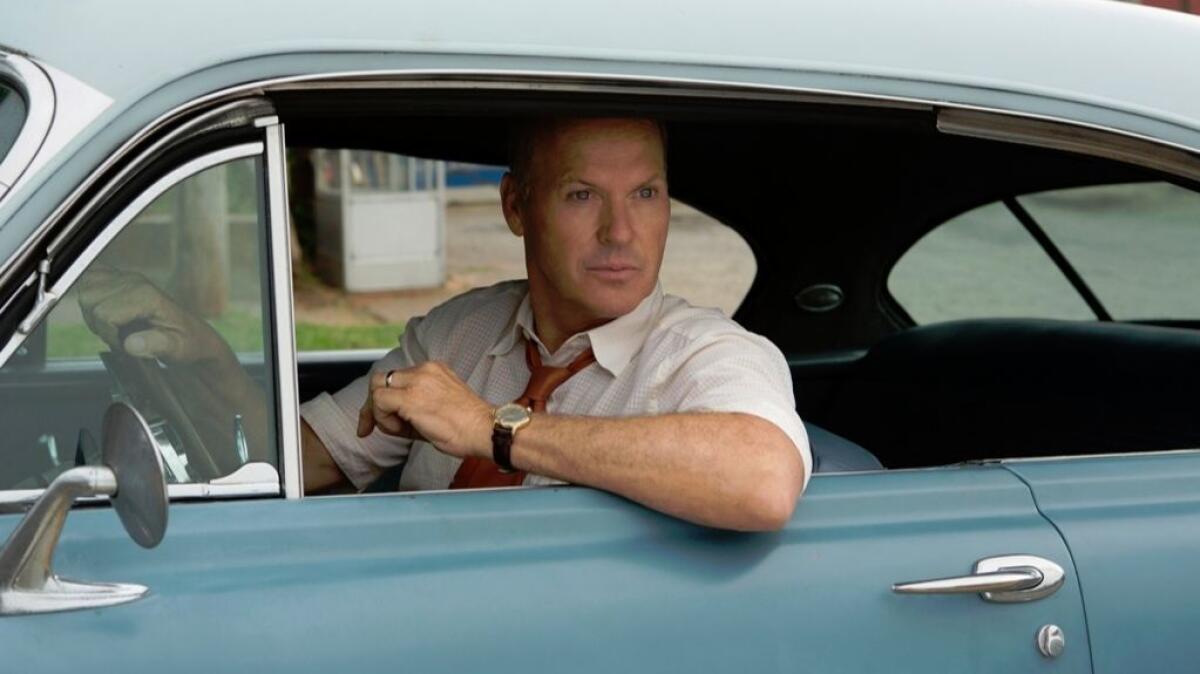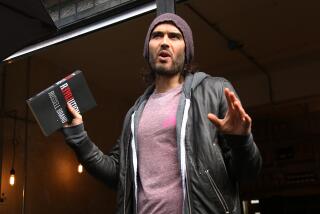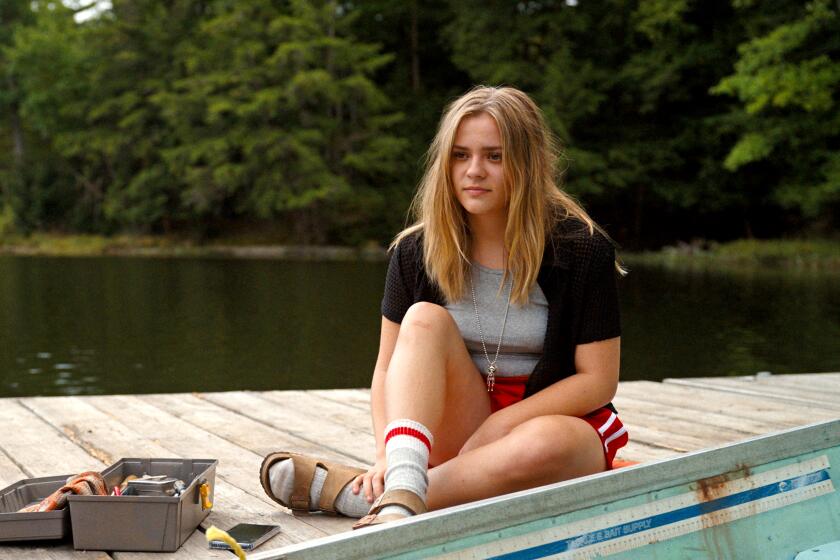‘Founder’ director John Lee Hancock sees parallels between its subject Ray Kroc and Donald Trump

There’s a scene in new movie “The Founder” in which its subject, Ray Kroc, the failed salesman turned visionary of the McDonald’s fast-food empire, is recruiting new franchise owners by speaking to church and civic groups, at synagogues and to Boy Scout leaders, among others.
Director John Lee Hancock remembered telling actor Michael Keaton, who plays Kroc, he was going to shoot him in six places, saying essentially the same thing, and intercut the scenes, so the actor should just “bang those home.”
“You look at it, the section where he [says], ‘I’m gonna take it to the hardworking Americans and that’s who’s going to make it grow.’ It’s not so much the message, it’s the branding of the message, it’s ‘pound home the big ideas whether they’re jingoistic or simple or not, just bang those home and people will come.’”

Justin Chang reviews “The Founder,” directed by John Lee Hancock and starring Michael Keaton. Video by Jason H. Neubert.
“The Founder” was written by Robert D. Siegal, shot by Hancock and delivered to the Weinstein Co. before Donald J. Trump was even the Republican nominee for president. But it opened in wide release, after a short awards-qualifying run in December, on Friday, the day Trump was inaugurated.
Hancock watched the film again at a screening for a publicity event. “So looking at through the lens of having gone through the election, I thought, ‘There’s somebody else I’ve seen do this!’”
It was an insight others have picked up on. “However decent the director’s original intentions, ‘The Founder’ emerges as the first Trumpist film of the new era,” New Yorker critic Anthony Lane wrote in his review.
“I get asked a lot about the current political climate,” Hancock said in an interview a week before the release and swearing-in. “People make the parallel to Trump, this man rising to the top, branding. There are some similarities.”
But, he says, “when I first read the script, Donald Trump was a businessman, not a politician.”
McDonald’s history
The title of “The Founder,” is purposely wrong; Kroc did not found McDonald’s.
After years as an unsuccessful salesman, he stumbled upon Dick and Mac McDonald’s (played by Nick Offerman and John Carroll Lynch) operation while peddling “the multimixer,” a milkshake machine with six spools. Kroc saw potential in their well-designed and choreographed burger-fries-and-a-shake stand and after persuading the reluctant brothers to franchise and grow aggressively, he wrested control from them and never looked back.
He did open the first franchise, a restaurant in Des Plaines, Ill., near his home in Arlington Heights, that he refers to in the film as “McDonald’s No. 1, where it all started.” But he clearly knows that’s not true.
Kroc didn’t have the gilded upbringing of a Trump, a father who staked him the start of his career or success in any career before McDonald’s. The movie presents him at first as a desperate salesman who wanted to make his mark.
It follows him through less sympathetic moves, buying control of the company for $2 million and later reneging on an agreement to give the McDonalds a percentage of the company’s profits for life, or romancing the wife of a franchise owner (who became his second wife, Joan Kroc, who outlived him and became a significant philanthropist.)
“If America had a motto it would be pull yourself up by the bootstraps, work harder than the next guy, have a goal and achieve it,” all admirable qualities, Hancock said. “I’ve never read a script in which you are actively pulling for the protagonist in the beginning but little by little you lose that.
“I eventually came down on the side that it wasn’t just greed. It’s never just greed. It has to have something to do with your own stuff. Your self loathing or a sense of ‘I’m owed and they’re gonna pay.’ I think he was in his 50s at a time when everyone else was retiring, and he had not yet rung the bell. ‘I work harder than everybody I know, I’m as smart as anyone I know,’” Hancock imagines him saying to himself. “ ‘Why not me? Why not now?’ ”
“The Founder” takes its place among other movies Hancock has made that deal in different ways with Middle America, or the American dream.
“The Rookie” (2002) follows a 35-year-old small town Texas high school teacher and coach who rediscovers his fastball and tries to make it back to the big leagues. The film is based on the life of pitcher Jim Morris. In “The Blind Side” (2009), another story based on real events, a white evangelical Christian family in Memphis adopts a homeless African American teenage boy, sends him to private school and engages tutors to help him make the high school football team, win a college scholarship and become an NFL draft pick. “Saving Mr. Banks” (2013) is a glimpse into the early ’60s empire of Walt Disney as the animator and mogul tries to persuade author P.L. Travers to sign over the film rights to her creation, Mary Poppins. He also made “The Alamo” (2004), about the 1835 battle in which an outnumbered band of Texans fought the Mexican army for independence.
But he shrugs off a deliberate choice of American themes and settings for his work. He says it’s a function of what projects he is considered for and what he is drawn to.
“I can see where people would say, ‘You make very American movies.’ But I’m not sure that in the decision-making process that goes through my brain,” he noted. “More than anything for me is, ‘Is this something I want to spend a minimum of two years on?’
“There’s no doubt that I’m probably sent projects for a reason,” he said. Though he and his wife now live with their two teenagers in Pasadena, Hancock is from Texas City, Texas, a refinery town. “I know these people. I think I’m at my best when I really understand and can smell my characters.”
Screenwriting background
Hancock’s ability to elicit big performances may mark his most recent movies, but he began in the business as a screenwriter.
Tall, thin, blond and friendly, the 60-year-old Hancock’s first association with a big studio film was his 1993 screenplay for the Kevin Costner film “A Perfect World,” directed by Clint Eastwood. He went on to adapt the John Berendt bestseller “Midnight in the Garden of Good and Evil” for Eastwood.
“The Rookie” was a modestly budgeted small-scale success for Disney that he adapted and directed, but his breakthrough was “The Blind Side,” based on a portion of the book by Michael Lewis. The film, which he wrote and directed, was nominated for the best picture Oscar, and Sandra Bullock won for lead actress for her performance as Leigh Anne Tuohy.
He had a different experience four years later with “Saving Mr. Banks,” which also featured a strong performance with awards buzz, this time from Emma Thompson. But “the knives were out,” Hancock says, and the picture’s chances were scuttled by rumors circulating about unpopular political stances by Walt Disney. He calls awards season his least favorite time of year.
Despite his background as a screenwriter, Hancock says that as a director he looks for “little bits that aren’t in the script, bits of behavior that you can build into a scene or into a character that’s not as obvious as dialogue.”
Keaton, he says, is particularly adept at such moments. “He’s able to bring human comic behavior touches as well as go to a deep well of stuff,” Hancock said. “He has a forward lean to him. When he’s trying to sell you on something he is really animated, really convincing. He’d be a great salesman.”
He needed an actor the audience would follow from his harried state early in the film to his success at all costs. “He came from nothing, he was a workaholic. He was incredibly loyal to his employees.” But he evolves from behavior that Hancock describes as “Hmmm” to “Wow; I hope I wouldn’t have done that.” Kroc “appropriates a lot from people — ‘I’ll take your idea,’ ‘I’ll take your wife,’” Hancock says.
He says he knew after seeing “Birdman” that Keaton was the kind of actor he needed, one with tremendous energy who could carry the film. Keaton has been talked about as a contender for lead actor, but it’s unclear whether his performance as Kroc has gained traction; the film itself has been largely overlooked during awards season.
That may be in part because of its unorthodox release. First set to be released in November, it was moved to August, then shifted to a Dec. 16 opening. The Weinstein Co. changed course again in early December, opening it abruptly on one screen for a week to qualify for awards but holding off a larger opening until this month.
“Whenever a film has three different release dates, people understandably assume that there must be something wrong with it,” Hancock said. “ ‘The Founder, once completed and delivered many, many months ago, never went through any changes, other than the release date. It was frustrating to say the least but I have no control over those decisions and hope that where we landed ends up being the right choice.” Weinstein has told The Times his company is fully behind the film, supporting it with advertising and an Oscar campaign for Keaton.
Hancock is a believer in the idea that period movies like “The Founder” say more about the period they’re released in than the period that they portray. The delay in its release has nothing to do with the political calendar, but the movie does open in Donald Trump’s America.
“Donald and Ray were both shrewd, take no prisoners businessmen who understood the importance of branding,” Hancock says. “Kroc used the McDonald’s name and Trump his own.”
But there is another parallel in a plaintive question Kroc’s first wife (Laura Dern) asks him on his way up.
“The McDonald brothers business was also motivated for money and profit. The difference between them and Ray was one of philosophy, and when will enough be enough?”
More to Read
Only good movies
Get the Indie Focus newsletter, Mark Olsen's weekly guide to the world of cinema.
You may occasionally receive promotional content from the Los Angeles Times.









